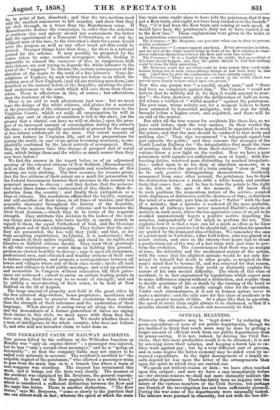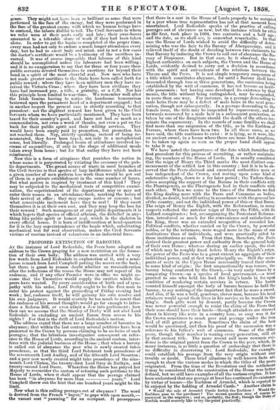OFFICIAL MEANNESS.
PERHAPS the estimates may be "kept down" by reducing the gross expenditure of some of our public departments, though we are inclined to think that much more may be done by getting a larger amount of efficient work from our public departments than by penny-saving. It is not, indeed, by driving the Civil Ser- vants, that this more productive result is to be obtained; it is not by screwing down their salaries, and keeping a harsh tale to en- force work against pay ; but by a very different sort of process, and in some degree the better economy may be aided even by in- creased expenditure. In the right management of a family re- sults depend far less upon the letter of the arrangements than upon the spirit in which they are carried out. We speak not without reason or data ; we have often touched upon this subject ; and now we have a case immediately before us—for obvious reasons we shall not more distinctly indicate the particular department. There has lately been an inquiry into the salary of the various members of the Civil Service, but perhaps one branch of the investigation has not been sufficiently pursued. During the war some of the departments were unusually tasked. The labours were pursued in obscurity, but not with the -less dili-
gence. They might not have been so brilliant as some that were performed in the hoe of the enemy, but they were performed in the face of the greatest enemy with which we human beings have to contend, the inborn dislike to toil. The Civil Servants to whom we refer were at their posts early and late; their over-hours amounted to a tolerable share of work if they had been taken alone. In order to get the business completed at the proper time, every man had not only to endure a much longer attendance every day, but he had to exert body and mind, and in not a few cases the doctor's certificate would be a testimony of the sacrifices in- curred. It was of course impossible that labours of this kind should be accomplished unless the labourers had been willing ; and it is no exaggeration to say that for three or four years these public servants devoted themselves to exertions far beyond their bond in a spirit of the most cheerful zeal. Now men who have not made greater sacrifices to the State have been called forth for public reward ; where they have been military men they have re- ceived the Victoria Cross ; where they have been civilians they have had increased pay, a title, a gratuity, or a C.B. Nor has this principle been limited to war-time. We remember well after the Irish famine having to notice the handsome honorarium bestowed upon the permanent head of a department engaged ; but in another respect the present ease is strictly according to that precedent: not the slightest reward has been given to the Civil Servants whom we have particularly mentioned. They have been taxed for their country's good, and have not had so much as a commendation, not even a word of thanks, not even a pat on the back for their public spirit and their willing services. They would have been amply paid by promotion, but promotion has not reached them. Nay, strictly speaking, instead of being re- munerated, they have been taxed, not only in a metaphorical sense, but literally. Prolonged hours of attendance involved in- crease of expenditure, if only in the shape of additional Meals taken away from home ; but for that outlay they have not been reimbursell.
Now this is a form of stinginess that punishes the nation in whose name it is perpetrated by vitiating the economy of the pub- lic departments. The grandsource of waste in most branches of the Civil Service is that species of lazy indifferente which makes a given number of men perform less work than would be got out of them in a private establishment in the same number of hours. But what motive is inspired by treatment of this kind ? They may be subjected to the mechanical tests of competitive exami- nation, the superintendent of the department may or may not enter their names in an attendance-book, marking the hours of their arrival at office ; they may escape notice or censure ; but what conceivable incitement have they to zeal ? If they exert themselves it is at their own cost, and they may keep the loss for their reward ! Such management of our public departments it is which begets that species of official atheism, the disbelief in any- thing like public spirit or honest zeal, which is the skeleton in every official house. It is born of indifferentism at head-quarters for it is the lazy superintendence of the heads which, substituting mechanical test for real observation, makes the Civil Servants victims of routine instead of volunteers in an industrial force.



































 Previous page
Previous page